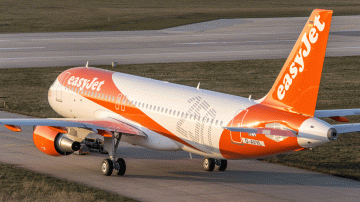
After a turbulent year for low-cost carriers, with profits plummeting and airlines grounded, Easyjet is looking relatively unscathed.
Non-executive chairman John Barton has called 2018 a “tough but successful” year, with Brexit uncertainty, high oil prices and the global economic environment offset by record revenues.
Like fellow LCCs Norwegian and Ryanair, revenue was up – in Easyjet’s case from £5.04bn to £5.898bn – meanwhile it managed to increase its profit before tax by £60m, to £445m.
At the Business Travel Show in London this week, Easyjet’s Head of Business Development Andrea Caulfield-Smith said a 10 per cent year-on-year rise in passenger numbers to 88.5 million was helped by the increasing number of corporate travellers on its routes, who may also be converted to leisure passengers.
“People really take Easyjet seriously for business now. We carried 15 million business customers last year and we expect that to grow significantly this year,” Caulfield-Smith told Business Traveller.
“Customers are seeing us as a viable alternative to the legacy carriers. We allow customers to choose what options they want to purchase and build their fare based on the wants and needs of the individual carrier.
“What we’ve seen in recent years is that the legacy carriers operate in a very similar model, which evens that playing field in terms of what we have versus what they have.”
While targeting a young crowd with ad campaigns such as ‘Generation Easyjet’, the airline has spent the last decade trying to increase its appeal to the business travel sector, introducing allocated seating, invoice capability and fast-track security.
It launched loyalty schemes – invitation-only Flight Club and paid-for Easyjet Plus – which it now says it will expand to add points earning and redemption offers.
And since 2017 it has been expanding its connections programme Worldwide, which has attracted carriers including Cathay Pacific, Emirates, Virgin Atlantic and Singapore Airlines (a dig through the Business Traveller archive shows Easyjet’s former CEO stating that interlining with other airlines was not an attractive prospect in 2015.)
Worldwide allows passengers to book their long-haul flight through the Easyjet website, though the carrier stresses that late passengers will be put onto the next available flight to avoid delays.
“The larger carriers are seeing the opportunity of connecting customers onto their network irrespective of whether they fly to certain points within Europe. By partnering with Easyjet it gives them that breadth of customer. And it gives us a different target audience and more varied options,” Caulfield-Smith said yesterday.
Easyjet was named Business Airline of the Year at the Business Travel Awards 2019.
Caulfield-Smith said that was down to its network, schedules, and attractive fares amid squeezed travel budgets.
“A really important thing is that we’ve got the breadth of network – 1,045 connection points in 34 countries. We’re operating not only to the primary airports but we’re giving business customers the network and the schedule they want,” she said.
In order to increase numbers further, the carrier is working on a portal for SMEs to streamline travel management and looking at how to deliver business fares in bundles, Caulfield-Smith added.
On the uncertainty presented by Brexit, she said: “We are confident that we will continue to fly irrespective of what decision is made. We’ve set ourselves up to be able to continue flying, so we have the airline operating licence in the UK, one in Europe headquartered in Vienna, and one in Switzerland. It gives us the breadth and capability to continue flying.”
The carrier says it has 130 aircraft registered in Austria and a spare parts pool within the EU. It also says that in order to remain owned and controlled by EEA qualifying nationals, it may suspend shareholder rights or force the sale of shares. Its ownership by EEA nationals, excluding the UK, is “around 49 per cent.”
“As a business, we’ve actually seen more customers book post-Brexit dates than this time last year. So we’re not seeing customers slow down their booking and buying behaviours, certainly in the corporate space,” Caulfield-Smith said.
“Customers are still travelling and having spoken to a number of travel buyers in big organisations, they’re all saying it’s business as usual.
“But obviously situations can change… depending on what happens in the next 48 hours,” she said with a laugh.
Easyjet managed to offset some of the impact of fuel price increases through hedging, and has kept load factors relatively stable amid stiff competition – unlike Flybmi, which ceased operations earlier this month. Is Easyjet planning to swoop in on some of the left-behind routes, as Scottish carrier Loganair has?
“It’s early days, conversations are still ongoing,” Caulfield-Smith said.
“We need to consider whether it makes sense strategically, commercially and operationally. Plans will be announced as and when.”
This year could also see Easyjet enter into a consortium with US giant Delta and rail company Ferrovie dello Stato Italiane to take over Italy’s cash-strapped flag carrier Alitalia.












